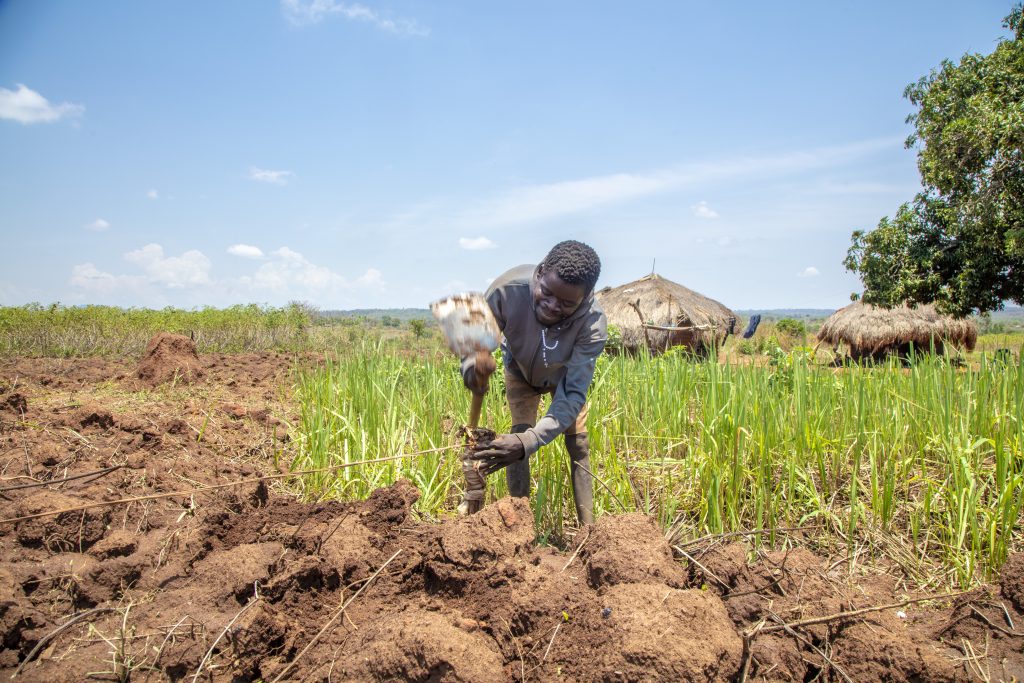Annual Report 2023
What did we do in 2023? The We are Able! (WaA!) consortium is pleased to share the highlights, challenges, facts and figures we faced in 2023 on our road to promoting food security for persons with disabilities and to ensuring their civic space in political decision making with you.
Training Manual Inclusive Land Rights
Practical training material for inclusive land rights is now available! The training manual consists of two modules:
- Module 1 is a general introduction to provide basic knowledge on land rights;
- Module 2 is specifically focusing on inclusive land rights, barriers for persons with a disability, and lobby & advocacy strategies for more inclusive land rights and land governance.
The target audiences for the training manual are:
- The WaA! project staff and partners to get familiar with inclusive land rights to be able to facilitate the training themselves.
- OPDs, CSOs, Disability Inclusion Facilitators (DIF) and master trainers to capacitate them and help them formulate concrete lobby and advocacy goals and actions for inclusive land rights.
The training manual comes with a PowerPoint presentation, it includes examples from the six WaA! countries, and is very easy to use for any training facilitator.


Five We are Able! Advocacy Cases
As We are Able!, we have gathered multiple best practices from our several years of experience to showcase what kinds of measures in policies and law have been successful in working towards our goal: increased food security for persons with disabilities in the six countries we work in. These cases are more practical recommendations, adding to the general recommendations in the below position paper.
We welcome you to read our approaches and invite you to investigate how to incorporate it into your policies regarding food security.
Annual Report 2022 – Summary
What did we do in 2022? The We are Able! (WaA!) consortium engaged in numerous pivotal activities in 2022 to promote food security for persons with disabilities and to ensure their civic space in political decisionmaking. We are pleased to share the highlights of our 2022 work.


Position Paper: Towards Inclusive Food and Livelihood Security
The WaA! position paper is an exploration of the realities experienced by persons with disabilities in East and Central Africa. At the consortium level, we delve into their daily challenges and examine how these adversities directly impact their food and livelihood security, drawing upon our findings from the past two and a half years.
Would you like to know more?
Disability Inclusive Communications Guidelines
“Communications play a key role in changing norms and shifting from a charity or medical model to a social model or to the human rights-based approach that should guide all communications.”
The We are Able! programme staff considers this statement by the United Nations to be true.
We strive for a society that leaves no one behind. This society starts with the way we communicate ourselves. Therefore, we have created this document to help everyone involved in the We are Able! Programme and its partners to communicate in a disability inclusive manner.
Thank you for applying these guidelines!

Annual report We are Able! 2021
What did we do in 2021? On June 1st, We are Able! presented its first annual report to our donor, the Dutch Ministry of Foreign Affairs. Although 2021 is only the first year of the WaA! consortium, we are proud to present the first results of our work.
What is the role of religion in the inclusion of people with disabilities?
By Jolijn Kersbergen, ZOA (consortium partner of We are Able!)
During my internship at ZOA and the We are Able! program, I have carried out a research project on the link between religion and disability inclusion. Religion is a very important factor in shaping norms and behaviour in a society, and therefore crucial to consider if you want to change stigmatizing norms and practices.
For this research project, I have looked at academic literature on the link between religion and disability inclusion, I have studied key We are Able! documents and I have interviewed We are Able! staff members on this topic. Currently, religious norms and religious actors are not intentionally targeted in the We are Able! program. This policy brief explains why religion is important in disability inclusion and offers recommendations for the role it could play in We are Able!

Overcoming barriers to food security
How is the We are Able! programme in Uganda supporting people with disabilities to overcome barriers to food security? Read more about this in a photonarrative report by We are Able! in Uganda.

Scoping studies We are Able!
We are Able! has arranged for a scoping study to be conducted in Ethiopia, Uganda and DR Congo. This study contributes to filling the knowledge gap on the challenges and problems faced by persons with disabilities to access services and resources.
The study also critically reflects on assumptions and discourses guiding interventions to remove social barriers that hinder persons with disabilities from fully participating in society, and to enhance learning with partners and develop adaptive programming.
Would you like to know more?